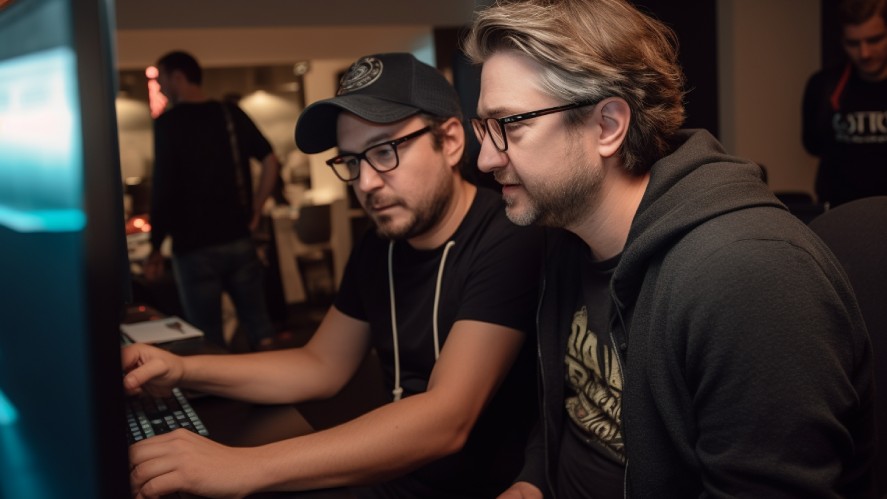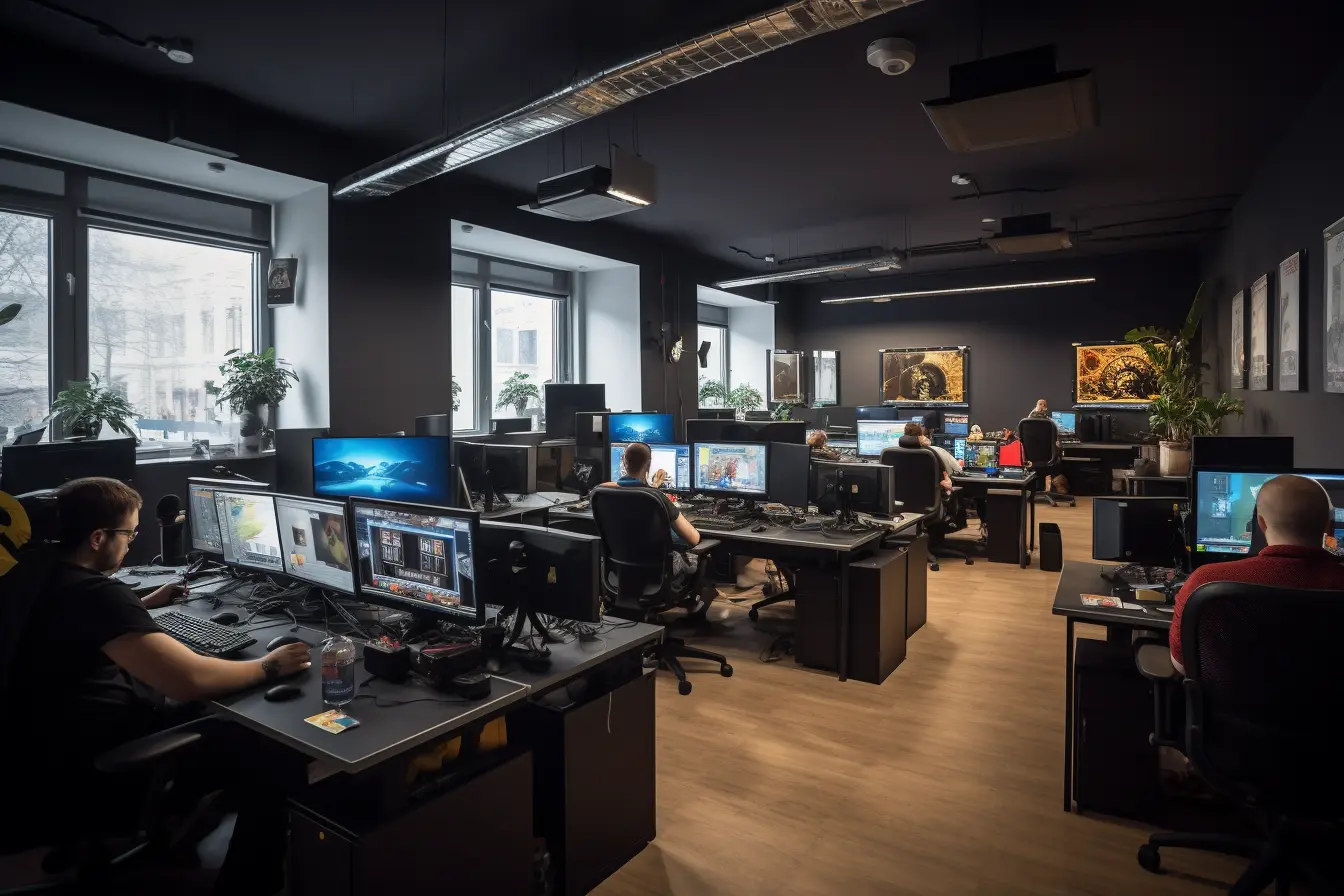The world of gaming is constantly evolving, captivating millions of players worldwide.
But have you ever wondered about the creative forces behind these immersive experiences? Enter the game development studio, the powerhouse responsible for bringing virtual worlds to life.
In this article, we will explore what a game development studio is, delve into its responsibilities, discuss the process of building a studio, and highlight the advantages of establishing one.
Understanding Game Development Studios
A game development studio is a specialized team of professionals collaborating to create video games. A game development team structure consists of:
- Game designers
- Game programmers
- Game artists
- Game writers
- Game testers
- Game producers
Whether it’s a small indie team or a large-scale AAA studio, game development studios contribute their unique skills to craft captivating gaming experiences.
Responsibilities of a Game Development Studio
When it comes to bringing virtual worlds to life, game development studios are the creative powerhouses behind the immersive experiences that captivate millions of players worldwide.

Let’s explore the key responsibilities of a game development studio in detail and gain insights into the intricate processes involved in creating remarkable video games.
1. Conceptualization and Ideation
During the conceptualization and ideation phase, a game development studio takes on the crucial task of generating creative ideas and conceptualizing the game’s core elements.
This involves brainstorming and exploring various gameplay mechanics, storylines, and visual design concepts.
The studio aims to create an extraordinary and immersive encounter for players, crafting a captivating world that draws them in and keeps them hooked.
2. Game Design and Prototyping
Game designers play a pivotal role in the video game development process.
They are responsible for creating detailed game mechanics, level layouts, character designs, and other essential elements that contribute to the overall gameplay experience.
Through prototyping, these concepts are tested and refined to ensure they align with the desired vision for the game.
3. Programming and Technical Implementation
The programming and technical implementation phase involves the expertise of skilled programmers who bring the game to life through code.
They develop the codebase that runs the game, focusing on smooth functionality and addressing any technical challenges that may arise.
Programmers work closely with designers and artists to integrate various game elements, ensuring players a seamless and immersive gaming experience across different platforms and devices.
4. Art and Audio Production
Artists and audio professionals are responsible for the visual and auditory aspects of the game.
They create visually stunning graphics, animations, and immersive soundscapes that enhance the player’s immersion in the game world.
Artists work on character designs, environments, special effects, and other visual elements. While audio professionals design and produce music, sound effects, and voiceovers.
5. Quality Assurance
Quality assurance (QA) testers ensure the game meets the highest standards of quality. They rigorously test the game to identify and report bugs and performance issues.
Through comprehensive testing, QA testers provide valuable feedback to the development team, helping them refine and polish the game before its release.
6. Project Management and Coordination
Producers act as the bridge between different departments, facilitating collaboration and ensuring everyone is working towards the goal of delivering a high-quality game.
They ensure that the project stays on track, milestones are met, and resources are allocated effectively.
How to Start a Game Development Studio
Setting up a successful game development studio requires careful planning and strategic execution.

Let’s delve into the crucial aspects of building a game development studio and explore the steps involved in creating a thriving creative hub for game development.
1. Defining the Vision and Mission
Before establishing a game development studio, it is essential to clearly articulate the studio’s vision, mission, and values.
This includes defining the goals, target audience, and the type of games the studio aims to create. Having a well-defined vision provides a guiding light throughout the development process.
2. Assembling the Team
The backbone of any game development studio is the talented team of professionals with diverse skill sets. So, identifying the required game developer team roles and hiring individuals with a passion for gaming and a range of expertise is crucial.
Key roles in a game studio include:
- Game designers: responsible for conceptualizing gameplay mechanics, level designs, and overall game structure.
- Programmers: develop the underlying code and algorithms that power the game.
- Artists: create visually appealing assets.
- Writers: craft compelling narratives and storylines.
- Sound designers: design and produce audio elements.
- Quality assurance testers: rigorously test the game to ensure its quality.
- Producers: oversee project management and coordination.
If you want to learn more about the salary of each role in the game development process, check out the “How Much Do Game Developers Make?” article.
3. Establishing a Work Environment
Creating a conducive and inspiring work environment is vital for the success of a game development studio. Plus, fostering a culture of collaboration, innovation, and creativity among team members is essential.
Providing the necessary resources, tools, and infrastructure, such as powerful hardware and software, comfortable workstations, and efficient communication channels, enables the team to work efficiently and effectively.
4. Obtaining Funding
Financing the development process is critical to building a video game development studio.
Various options to secure financial resources include self-funding, seeking investors, crowdfunding platforms, or applying for grants from organizations that support the gaming industry.
Careful financial planning and budgeting are essential to ensure the smooth progress of the studio’s projects.
5. Acquiring Necessary Technology and Software
Game development studios need access to the right technology and software to bring their creative visions to life. This includes selecting suitable game engines, art tools, and version control systems.
Evaluating the requirements of the studio’s projects and considering factors such as scalability, ease of use, and compatibility are crucial in making informed decisions about the technology and software infrastructure.
6. Networking and Partnerships
Establishing strong connections within the gaming industry is invaluable for a game development studio.
Building relationships with publishers, video game distributors, and other relevant entities opens doors to potential collaborations, marketing opportunities, and wider exposure for the studio’s games.
Networking events, industry conferences, and online communities provide platforms for studios to connect with industry professionals and explore partnership opportunities.
Advantages of Building a Game Development Studio
Building a game development studio offers many advantages that contribute to the success and growth of the studio and its team members.

Let’s explore the key advantages that come with establishing a game development studio.
1. Creative Freedom and Artistic Expression
One of the most significant advantages of having a game development studio is the creative control it provides.
With a studio, the development team has the freedom to explore unique concepts, innovative gameplay mechanics, and visually stunning designs.
This creative freedom allows them to push boundaries and create immersive gaming experiences that captivate players.
2. Ownership and Intellectual Property
Building a video game development studio enables developers to retain ownership of their creations. This ownership provides a sense of pride and fulfillment and lays the foundation for long-term success.
Owning the intellectual property of their games allows studios to explore sequels, spin-offs, and other derivative works, further expanding their presence in the industry and establishing a valuable portfolio of games.
3. Career Opportunities and Growth
Establishing a game development studio contributes to the growth of the local gaming industry and economy.
The studio plays a crucial role in fostering career growth and development by creating job opportunities for talented individuals.
It attracts skilled professionals who are passionate about gaming and provides them with a platform to showcase their talents and contribute to the evolution of the industry.
4. Collaboration and Teamwork
Dedicated game development studios encourage collaboration among team members, fostering a supportive and creative environment.
Professionals from various disciplines within the studio, such as game designers, programmers, artists, writers, and sound designers, work together, sharing their expertise and knowledge.
This collaborative approach allows for the exchange of ideas, learning from one another, and ultimately creating exceptional games that surpass individual contributions.
5. Potential for Financial Success
Successful games developed by the studio have the potential to generate significant revenue.
A game’s financial success can establish the studio as a reputable player in the industry, attracting attention from game publishers (Playsaurus, for example), investors, and other potential partners.
The revenue generated from successful games supports the studio’s growth and sustainability and provides the resources needed to pursue future projects, explore new ideas, and forge strategic partnerships.
To learn more about game publishing and how a game publisher can help you with this process, check out the “Top 10 Reasons to Work With a Game Publisher” article.
Conclusion
Establishing a game development studio is an exhilarating endeavor that offers unparalleled creative freedom, endless opportunities for growth, and the potential for remarkable financial success.
Embrace the challenge, gather a talented team, and embark on the journey of bringing your gaming dreams to life. The world of game development awaits your unique vision and unwavering passion!
Loading survey...

